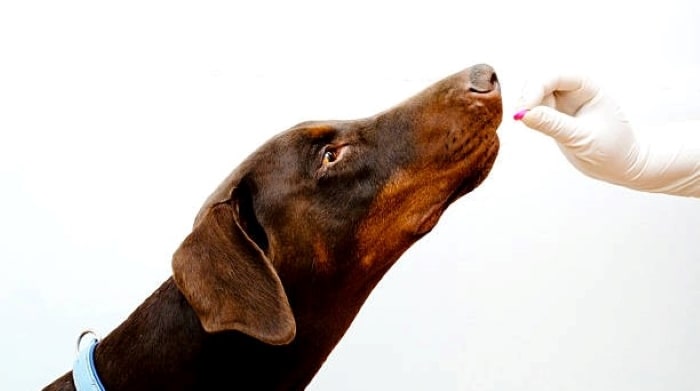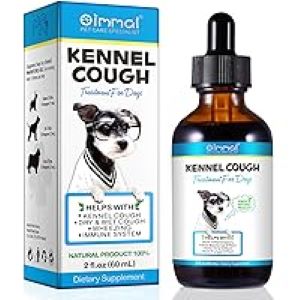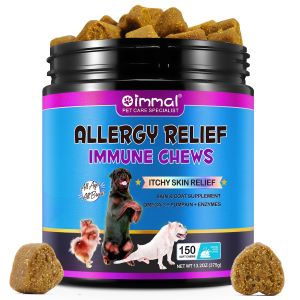Being a dog parent, you might have questions like Can My Dog Have Benadryl? Is it really safe? Well, the first thing is, you should never give any medication to your pet without having a conversation about this with a veterinarian. The body system is different in these animals as compared to humans.
However, there are certain medications that are used for both these furry animals and humans but within specific dosage range. In dogs, Benadryl is a widely used drug which is used to treat allergies, travel anxiety, and motion sickness.

You Might Also Like:
What is Benadryl?
Benadryl contains an active ingredient called Diphenhydramine HCl that can cross the blood-brain barrier. So, it is very effective, but it also increases the risk of side effects.
You might have observed that suddenly your dog have allergic reactions like sneezing, itching and hives. In this situation, Benadryl can help to treat your dog from these symptoms.
However, since it’s not FDA-approved for veterinary use, you should always talk to your veterinarian before giving your pet any medication. As a dog parent, it is obvious that you get worried. So, allow me to help you find out, Can you give Benadryl to your pet?
Why Benadryl Is Used?
The main reason to use Benadryl is it relieves the symptoms of allergies such as itchiness, swelling, inflammation, runny nose, redness and other anaphylactic reactions in your pet. It is also used for treating motion sickness in dogs if they have to travel to long distances.
Benadryl is a drug that acts by blocking the effects of histamine that is released by the body in response to an allergen. These allergies arise because of histamine, so by stopping this chemical it can reduce the allergic symptoms.[1]
It may make your dog sleepy and unresponsive, but it is not much effective in treating their anxiety. You should consult a vet about this illness before giving him any medicine.

Is It Safe?
As recommended by Merck Veterinary Manual, the ideal dose of Benadryl to dogs is 2–4 milligrams of drug per kilogram of body weight, two to three times a day. It is usually given as a tablet or capsule. However, this dosage can vary depending on your pet’s medical conditions.[2]
If you follow the instructions of your vet, then Benadryl is safe for your dog. But, there are certain cases where your dog might have another severe illness and after giving him this drug it will worsen the health of your dog.
Thus, it is better to have a discussion with your vet about the symptoms that your pet is facing. And to be safe, always keep all the medications away from these furry pals to avoid any emergency situation.
In case of Benadryl overdose in dogs, there is hyper excitability in the Central nervous system. The warning signs that you should be looking for are: Constipation, Rapid heartbeat, Agitation, Seizures and Dilated pupils.
If you observe any of these warning signals, then you have to contact your vet immediately or contact emergency veterinary hospital.

Side Effects of Benadryl
Benadryl for Dogs is safe, but every pet owner should monitor their dog after giving any medications. Medicines are avoided in dogs having conditions such as : Glaucoma, Allergic lung disease, Seizure disorders, Cardiovascular disease, Hypothyroidism, Hypertension, and Pregnancy.
Generally, the side effects of Benadryl are clearly visible after some time. The common side effects of Benadryl in dogs include:
- Drowsiness
- Hypersalivation
- Increased heart rate
- Dry mouth
- Urinary retention
- Rapid breathing
One should avoid giving Benadryl when the ingredients contain alcohol or sodium in it. As these compounds results in other side effects, they are harmful for your dog.

FAQs
Can I give my dog Benadryl to sleep?
Yes you can, in fact many dog parents give their dog Benadryl when they feel they want their dog to stay calm and less responsive like on the days when they have to travel. Benadryl do have sleepiness as a side effect, but it is not an effective sleeping aid.
How long does Benadryl last?
Benadryl lasts for 4 to 6 hours and the standard dose of this drug is 1 mg per kg, but it can vary from 2-4 mg per kg of body weight and depending on the symptoms it is administered. You can give your dog Benadryl every 8 to 12 hours.
What does Benadryl treat in dogs?
It works mild to moderately in treating allergies. Also, motion sickness is common in dogs so to prevent that this medication is used. Seasonal allergies, environmental allergies, and other food allergies can be treated with this medicine.
How fast does Benadryl work for itching?
Benadryl is absorbed quickly in the body, and it takes around 30 minutes to show the effect. This medication should be given under the surveillance of any animal doctor.
Summary
Benadryl is an anti-histamine medicine, mostly used to treat allergies like itching and sneezing. This medication is also used to prevent motion sickness in dogs. The preferable dose of Benadryl in dogs is 2-4 mg per kg.
Overdose will create toxicity in dogs. This drug also shows certain side effects like drowsiness, which is actually helpful to make your dog sleepy when you have to travel along with your pup, but it is not helpful in treating anxiety in these furry friends.
There are rare side effects of this medication like hypersalivation, increase in heart beats, rapid breathing and others. It is advisable that one should consult a vet before giving your dog any of such medications.
References:
- Sicari, V. (2022, July 11). Diphenhydramine. StatPearls – NCBI Bookshelf.
- Merck Veterinary Manual. (n.d.). Table: Antihistamine Dosages – Merck Veterinary Manual.






